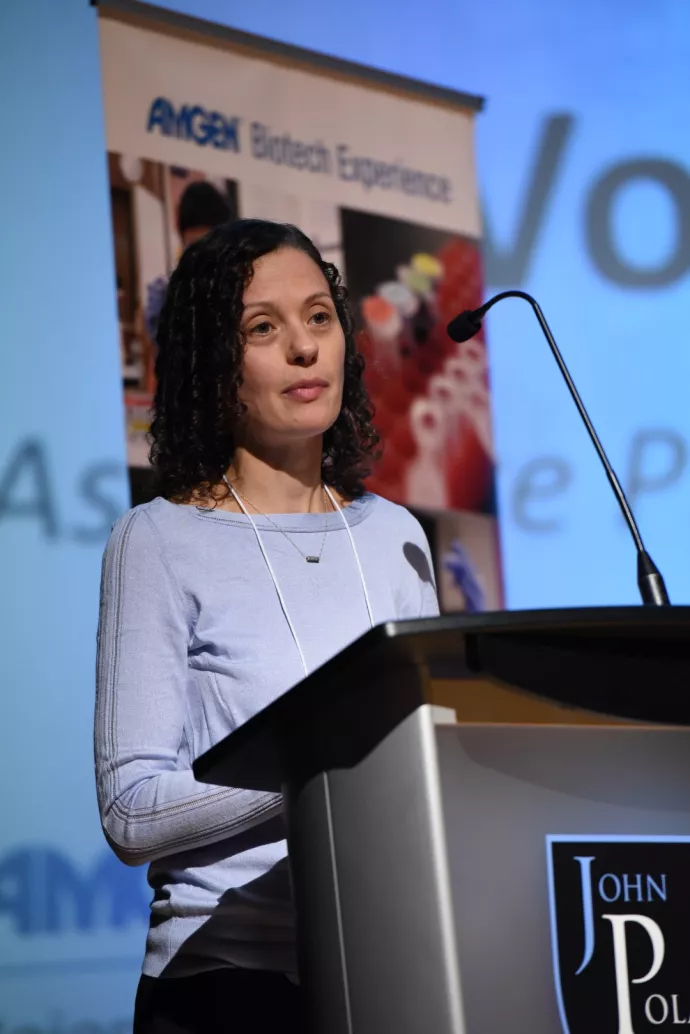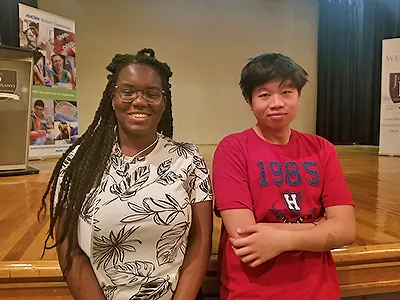
Helping youths discover biotechnology
A progressive initiative led by the University of Mississauga is engaging Ontario youths in practical science education.
The Amgen Biotech Experience (ABE@UTM) creates opportunities for high school students to learn about the biotechnology field in hands-on ways. Through access to free professional equipment and expertise, teachers introduce students to the core concepts, technologies and techniques of biotechnology, and lead them in exercises that involve creating actual biotechnology therapies. The program was highlighted Oct. 11 at an open house at John Polanyi Collegiate Institute in Toronto, in which the hundred or so students who attended learned how ABE@UTM fosters interest in scientific discovery among young people.
“These kids are doing sophisticated experiments of the kind that we did in our undergraduate teaching labs in third-year biology,” says Voula Kanelis, associate professor of biology and chemistry at UTM, who oversees the program together with UTM biology professor Steven Chatfield (teaching stream). “The students build their science knowledge and skills, they get to have a lot of fun, and it’s at no cost to them.”
ABE@UTM is a collaboration between UTM and Amgen Canada, the Mississauga-based office of a leading international biotech company whose foundation funds the initiative. Since its launch in 2017, the program has reached more than 300 post-secondary students across Ontario. In the 2018-19 school year, the program will be delivered in 28 schools across seven school boards. The initiative is part of AMGEN’s effort to improve science education worldwide: since being established in 1989, ABE has reached almost 700,000 students across North America, Europe and Asia Pacific.
“Thirty-five years from now, Canada will need more than 90% of its workforce to have STEM backgrounds in order for us to continue to be a productive society,” said Leann Sweeney, director of Amgen Canada. “You will be the ones making sure that science, technology, engineering, arts and math continue to move ahead, and that we solve the world’s hardest problems and humanity’s greatest needs through your abilities.”
Aligned with the Ministry of Education’s curriculum for grades 11 and 12 biology, ABE provides schools with comprehensive resources and support to conduct various biotechnology lab experiments within a three-week period. In-depth curriculum guides are provided to teachers and students, along with training to support teachers, as well as research-grade lab equipment and supplies to carry out learning activities. The activities parallel some of the important steps of genetic engineering that are used to develop medicines for a variety of diseases.

“Biotech is one of the most important applied interdisciplinary fields of the 21st century, because it has wide applications in areas like agriculture, medicine, environment and commercial industries, and it draws upon all subjects you’re learning about in your courses now…Since curiosity and questions are at the heart of innovation in biotech, I’ll ask you, what problem do you want to solve?” said John Polanyi science teacher and ABE facilitator Nicole Anthony.
“Science has been making many advances in different areas over the last few years, and you students can be part of all of these discoveries,” said Robin Martin, MPP for Eglinton-Lawrence. “I’m sure this program will be a great opportunity to spark your imaginations and have you chase some really interesting ideas.”
The event involved a lab demonstration in which students engaged in a key step of completing ABE’s main objective: producing a functional protein from genetically modified bacteria. Grade 12 students Tran Pham and Akilah Laidley both see the program as a great way to develop their scientific literacy skills and learn about employment opportunities in the fast-growing biotech sector.
“I get to work with equipment at a high level, and without paying a big fee,” Pham says. “There are a lot of possibilities with genetic engineering.”
“I’m excited to see where the biotech industry helps us in areas such as food security and clean water,” Laidley said. “Maybe with biotech, we can find a way to solve these problems.”
